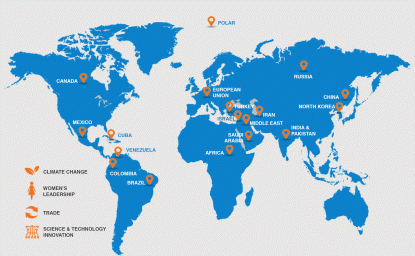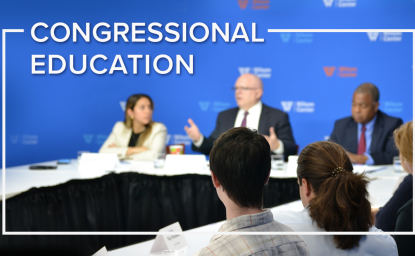The Latest
Europe expects:
- The United States will stand by its commitment to a secure and stable Europe.
- Trade agreements that benefit both American and European workers.
- Russia will not succeed in driving the United States from the EU nor expect America to ignore Russian efforts to divide the EU itself.
Q: What is the greatest challenge facing the U.S. relationship with Europe?
A: As President-elect Trump looks toward Europe, he sees a continent not fully recovered from the Global Financial Crisis that began in 2008. The European Union and its Eurozone still struggle with a currency that has left many members saddled with high unemployment and an inability to return to full competitiveness.
The economic difficulties, the lingering resentments about the bureaucracy in Brussels, the increase in immigration within and from outside Europe, and the sluggish economy have led to a populist reaction from both the right and left wings of European politics. There are active demonstrations against the Trans-Atlantic Trade and Investment Partnership negotiations between the United States and the EU. Then, Great Britain shocked the EU and much of the world by voting to leave the EU itself.
To the EU’s east, it faces Russian ambitions. There was an invasion of Georgia, the cyber-attack on Estonia, the annexing of Crimea and the active support for the rebellion in the eastern Ukraine. The Russian goal seems to drive the US out of Europe and to divide the EU itself.
Q: What are Trump’s options for dealing with these obstacles?
A: The American stakes in Europe are immense including trade, investment, international security, similar global goals and shared values.
President-elect Trump can respond to the anger and anxiety that fueled his campaign, the Brexit vote, and the discontent that is roiling the politics across Europe by using the TTIP negotiations to craft a trade agreement and adjustment programs that will benefit American and European workers as well as the two economies.
Q: What are Europe’s security concerns?
A: In terms of security, he will need to reassure NATO that the United States stands by its commitments. For long-term American support, Europe must pay a fair share for its own defense.
Finally, he must make clear to Russia that they will not succeed in driving the United States from the EU nor expect America to ignore Russian efforts to divide the EU itself. Trump could reduce EU dependence on Russia by allowing the export of natural gas. He can reduce the immigrant pressure on Europe by pursuing his idea of establishing large camps for refugees in the security of Turkey, Jordan, and Lebanon.
He talks frequently of how Russia and the United States could solve the challenge posed by Syria. He should reopen talks with Russia about creating a loose federation for Syria.
Guest

Former Director, Program on America and the Global Economy, Woodrow Wilson Center

Global Europe Program
The Global Europe Program is focused on Europe’s capabilities, and how it engages on critical global issues. We investigate European approaches to critical global issues. We examine Europe’s relations with Russia and Eurasia, China and the Indo-Pacific, the Middle East and Africa. Our initiatives include “Ukraine in Europe”—an examination of what it will take to make Ukraine’s European future a reality. But we also examine the role of NATO, the European Union and the OSCE, Europe’s energy security, transatlantic trade disputes, and challenges to democracy. The Global Europe Program’s staff, scholars-in-residence, and Global Fellows participate in seminars, policy study groups, and international conferences to provide analytical recommendations to policy makers and the media. Read more

Explore More
Browse Insights & Analysis
What Does the World Expect of President-elect Trump?

Promoting Convergence in US-Brazil Relations

360° View of How Southeast Asia Can Attract More FDI in Chips and AI



